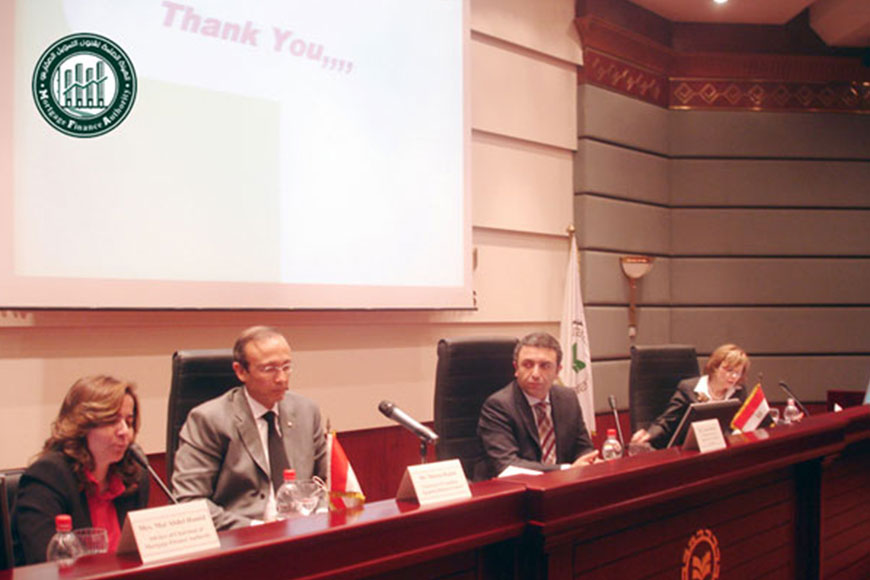
Date
Speaker(s)
Designation
Description
CEBC and the Canadian Businesswomen & Leaders’ Delegation were invited by Dr. Assem Ragab, Chairman of the General Authority for Investment & Free Zones, to a special meeting at GAFI’s premises.
The meeting was headed by Mr. Motaz Raslan, Chairman of Canada Egypt Business Council; Dr. Assem Ragab, Chairman of the General Authority for Investment & Free Zones; Ms. Kim Shannon, President & CIO of Sionna Investment Managers Canada, and Ms. Mai Abd El Hamid, Advisor to the Chairman Investors’ Affairs & Research, Mortgage Finance Authority.
Ms. Kim highlighted Canada’s position in the economic world as one of the major members of the G7. She drew attention to the role of Canadian women in business, especially in investment and financial dealings. She went on to emphasize how they successfully reached senior levels of management in those fields and specifically in the capital market arena.
Dr. Assem gave an informative presentation on the activities of GAFI, the investment climate in Egypt, the role of reform and its massive impact. He explained that “Egypt is internationally recognized for its ongoing progress in the investment sector, especially from the World Bank and the International Monetary Fund Organization”. Dr Assem went on to say: “According to 2007 financial figures, Egypt has around 11 billion US dollars of foreign investment whereby telecommunications, automotives, and consumer goods are of major importance and play a huge role in Egypt’s economic ongoing progress”.
Dr. Assem then stated some important facts about Canadian investments in Egypt. Total investments were figured to be 1.3 billion Egyptian pounds and they are expanding in new sectors, especially in petrochemicals. In its search to discover new investment opportunities in these sectors, Dr. Assem explained that recently Egypt was trying to explore more usage of gas, oil, and new variables in the renewable energy industry. Egypt is already working on that with Germany and Japan. Tax incentives are high in the agri-business industry and it capitalizes on large local markets, plus other trade agreements done in the region. The textile market, having a high share of Egypt’s economy, is supported by the transshipment industry which helps in the import and export process. Lots of trade and agreements are happening in this sector especially with Turkey and China.
GAFI gives the right to private sector businessmen to initiate their own investment zones by allocating the land, making master plans and getting revenue. GAFI provides the legal logistics to facilitate the process, in addition to providing the necessary skills sets by training them in creating their own successful zone areas. Additionally, they are given incentives and at the final stage, after the zone is built, employees are hired.
In closing, Dr. Assem underlined the clear progress in the private sector. In 2007 it constituted about 70% of the economy versus 20% in 2002.
Ms. Mai Abd El Hamid (Advisor to the Chairman of the Investors’ Affairs & Research, the Mortgage Finance Authority, presented a fruitful presentation on the mortgage finance market in Egypt. She gave the audience an introduction on the Mortgage Finance Authority and its objectives, one of which is to encourage the development of an accessible housing market. She also talked about the legal structure and the framework of the MFA, and how it provides guarantee and subsidiary funds, i.e. subsidies for low income mortgage buyers. She explained that the law is working on decreasing the cost for registering real estate properties and that the MFA has the authority to liquidate assets in the name of the Egyptian Mortgage Refinance Company. According to Ms. Mai secondary markets have a major role to play by offering funds & payments.
The presentation incorporated some figures and facts about Egypt’s economy. The Egyptian GDP reached a 7.1% increase in 2007; Egypt’s balance of payments reached 3.1 billion Egyptian pounds; real estate constitutes around 8.6 % of Egypt’s GDP; the average monthly family spending is 16.1 % of its income; Egypt has around 16.1 million residential units; its population increases annually by 2%, and 50% of the population is below the age of 35. It was also mentioned that Egypt currently has 12 banks that have mortgage units, 5 mortgage companies, and 222 licensed mortgage finance brokers. Other charts showed the total of mortgage loans in Egypt, the five year plan and some figures on mortgage volume in the market.
The meeting was followed by a question and answer session which covered different aspects of mortgage consumer awareness, investment banking, private equity and the possibilities for joint business opportunities between Canada & Egypt.



